A victory for good governance and political decency
By Ranil Wijayapala
|
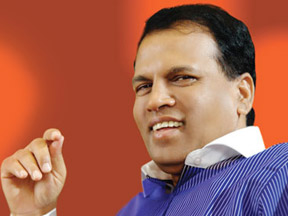
President Maithripala Sirisena
|
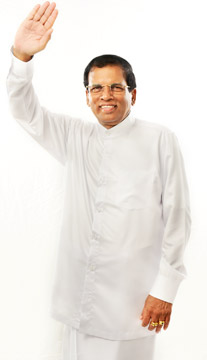 The seventh Presidential election that concluded on Thursday, saw the
election of Maithripala Sirisena, who defected from the UPFA government
and challenged former President Mahinda Rajapaksa, as the sixth
Executive President of Sri Lanka, left so many messages and lessons for
the people and the politicians of Sri Lanka. The seventh Presidential election that concluded on Thursday, saw the
election of Maithripala Sirisena, who defected from the UPFA government
and challenged former President Mahinda Rajapaksa, as the sixth
Executive President of Sri Lanka, left so many messages and lessons for
the people and the politicians of Sri Lanka.
Though many expected the victory of the common Opposition candidate
Maithripala Sirisena would lead to post-election violence the country
remained peaceful as the former President, accepting the decision of the
people made arrangements for the smooth shift of power to President
Maithripala Sirisena hours before the final result was declared by the
Election Commissioner Mahinda Deshapriya.
That was the type of gentlemanly politics the people of this country
expected from politicians and it was a relief to the majority citizens
who wanted the country to be peaceful after elections.
That situation enabled President Maithripala Sirisena to take oaths
as the sixth executive President of this country on the same date the
final result of the Presidential election was declared by the Election
Commissioner which seemed to be a rare occurrence in Sri Lanka.
Cost
Thousands of peace loving people who wanted a ‘change’ in the
politics of this country witnessed the true change they expected at the
oaths taking ceremony of President Maithripala Sirisena and Prime
Minister Ranil Wickremesinghe.
The ceremony proved that there was no necessity for politicians to
act as highly exclusive VVIPs and that they could mingle with the common
masses as the country is free of terrorism.
One website reported that the entire ceremony cost less than
Rs.10,000 including the cost of electricity.
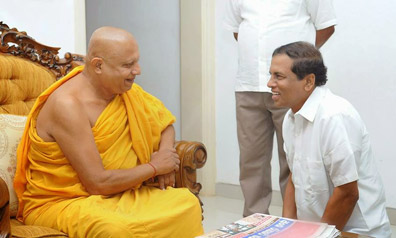 |
|
With the Mahanayaka Thera
of the Malwatte Chapter |
This is in stark contrast to similar events during the previous
administration which spent millions on grand opening ceremonies alone.
The success of President Maithripala Sirisena at the Presidential
election surprised many as they never thought that he could face the
campaign strategies of former President Mahinda Rajapaksa who was riding
his campaign over the successes he achieved in liberating the country
from the grip of terrorism and the development drive he continued during
his tenure.
The opposition did not have access to most of the resources available
to the then president.
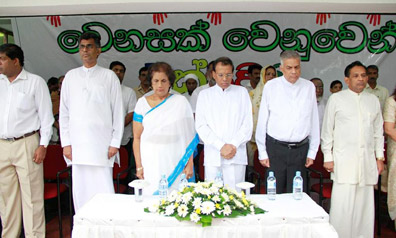 |
|
During the election
campaign |
But the common Opposition candidate managed to swim against the tide
facing all the challenges, criticisms and mud-slinging campaigns carried
out by the UPFA personally against him and also the common opposition.
It was through a step-by-step process that the common Opposition
candidate convinced the people of his future plans when the former
President was sticking to the slogan of war victory, development and the
allegation that Western nations backed a conspiracy to destabilise the
country. The fact that the election was called two years early by the
President himself was conveniently forgotten.
When they UPFA was reciting those like ‘mantra’ the common opposition
diversified their campaign on many aspects countering all the
allegations the UPFA candidate levelled against them garnering the
support of all communities.
Vote base
Though creative and entertaining, the voters were not in agreement
with the personnel mud-slinging campaign on Maithripala Sirisena, his
alliance and personally on former president Chandrika Bandaranaike
Kumaratunga.
Those attempts were condemned even within the circles of the UPFA as
they knew the mud-slinging is a factor that would distance the vote base
from them rather than attracting the voters.
People tend to accept the political satire at the political stage but
not the third class street language to attack and criticise political
rivals.
What vociferous Ministers Wimal Weerawansa, S.B. Dissanayake and
Dayasiri Jayasekara said on the political stage actually did harm the
campaign of former president rather than supporting him because it was
not only the party supporters they addressed. Their remarks struck the
intelligence of the youth and the common masses who witnessed it through
the electronic media.
The other factor that contributed to the victory of the common
candidate was the campaign carried out by the UPFA based on the war
victory. It was true fact that country won the war and the credit for
that should go to former President Rajapaksa, the Tri Forces Commanders
and personnel and political hierarchy and that was never denied by
political leaders.
In fact, President Maithripala Sirisena and Prime Minister Ranil
Wickremesinghe had acknowledged this. But the constant beating of war
drums became a negative factor for the UPFA campaign as people really
wanted to see a change in their campaign.
Biggest factor
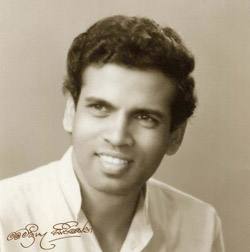 |
|
In his youth |
Though the war victory is still a factor to convince the adult voters
who suffered and experienced it, did not come handy to convince the
youth. Therefore, the primitive approach to convince the voters by the
UPFA came in handy for President Maithripala Sirisena to change the
mindset of the youth voters.
The biggest factor for the victory of President Maithripala Sirisena
came from the ethnic and religious minority of the country. Actually
redressing the grievance of the Tamil and Muslim community was expected
when Sri Lanka emerged victorious against terrorism, but they felt that
they were politically isolated by President Rajapaksa in the post
conflict era.Even at the Presidential election there was no genuine
attempt by the UPFA to include the Tamil and Muslim political parties
within their fold. Instead they used the minority factor to ‘prove’
their allegation that the common opposition is backed by the diaspora
community.
But Maithripala Sirisena was bold in his decision to
take the minority community within his fold even amidst scathing
remarks made on him by the UPFA saying he is grooming separatism in this
country. The presence of Jathika Hela Urumaya within the opposition
alliance and the backing of Janatha Vimukthi Peramuna helped him to
counter these separatism allegations and attract the voters in the South
towards him.
The Tamil National Alliance and the Muslim Congress also helped him
countering the allegation by the UPFA that common Opposition had a
secret pact with them. Rebel UNP MP Tissa Attanayake’s revelation of a
'secret' plan between the UNP and the Common Candidate also backfired
badly as it was widely perceived to be a forged document. Tamil and
Muslim voters’ support was another factor for his victory as he managed
to obtain 977,081 votes from the Northern and the Eastern provinces
against the 323,590 votes obtained by Mahinda Rajapaksa from the North
and the East.
The massive majority obtained from the North and the East helped
Maithripala Sirisena to stand strong when the Sinhala dominated South
was divided in voting for the candidates representing the Sinhala
community.
Responsibility
That could have been the same result in 2005, if Ranil Wickremesinghe
got the same support from the Tamil community in the North if the LTTE
did not block them from voting. Under the circumstances President
Maithripala Sirisena has a greater responsibility towards the minority
communities in the country. All Sri Lankans expect the new President to
do justice to the grievances of minority communities.
Another contributing factor for the success of Maithripala Sirisena
was the unity within the United National Party which was the main
political party supporting his candidacy in the election.
All the factions within the UNP united and supported his candidacy
even awakening its voters who had a lethargic attitude towards elections
due to its defeatist tendency in elections.
Though the UPFA tried its best to get Sajith Premadasa under their
fold they failed miserably in their attempt.
A news item to that effect telecast on the Election Day itself was
contradicted by Premadasa.
The only key supporter the
UPFA could catch was then UNP general secretary Tissa Attanayake.
The shift of the UNP general secretary post to Kabir Hashim also came
as a benefitting factor for the UNP to keep the Muslim vote base intact
within its party and get them to vote for Maithripala Sirisena.
Former President Chandrika Bandaranaike Kumaratunga was the prime
mover behind the attempt by the common opposition to end the Rajapaksa
regime. The masses of this country may have not forgotten the fact that
it was she who played the key role in changing the governments in Sri
Lanka in the recent past.
It was she who defeated then 17-year-long UNP regime after becoming
the Chief Minister in the Western province in 1993 and then defeating
the UNP government in August 1994 general election taking the challenge
after risking even her life.
In 2004, she was instrumental in toppling the UNF government after
taking over three key Ministries from the then UNF government led by
Ranil Wickremesinghe and later dissolving parliament. She managed to get
political parties with diverse political opinion even the JVP under the
UPFA and get the tide against the UNP and defeat it to set up the UPFA
government in 2004. That was the move which enabled Mahinda Rajapaksa to
contest the Presidential election in November 2005.
JHU
Though her charismatic leadership, political maturity she was able to
forge wider alliance including the SLFPers to back Maithripala Sirisena
enabling him to became the President.
Though she and Maithripala Sirisena could not get the desired number
of SLFP Ministers to defect the government she could manage to silence
many within the Government and stop them backing Mahinda Rajapaksa’s
campaign. They managed to get 15 to 20 percent of SLFPers to vote for
Maithripala Sirisena.
The backing of the JHU also came in handy for his victory as Ven.
Athuraliaye Rathana Thera and former Minister Champika Ranawaka became
key speakers in the election campaign to criticize corruption of the
government while the backing of the Sarath Fonseka helped him counter
the campaign of the former President on the lines of the war victory.
Apart from the political backing it is noteworthy to mention the role
played by the Election Commissioner and his staff to ensure that the
elections would be a free and fair. His bold action to stop last minute
attempt to mislead the people by electronic media and his bold statement
that election violence will not tolerated at any cost gave a strong
message to the people and the political parties to stick to the election
laws. Above all one factor that had helped Maithripala Sirisena
victorious at the election was the wise thinking of the people on
President Rajapaksa’s desire to go for a third term. Many of the wise
thinking people were of the opinion that he should respectfully quit
from his position after serving two full terms of Presidency.
Only then will people respect him for whatever the good he has done
for the country. That thinking especially among professionals and the
young generation put an end to his regime. It is now the turn of
President Maithripala Sirisena and his team to act on their words and
direct the country on the correct path and make it shine in the world
map ending the corruption and nepotism which were the hallmarks of the
previous regime. |

